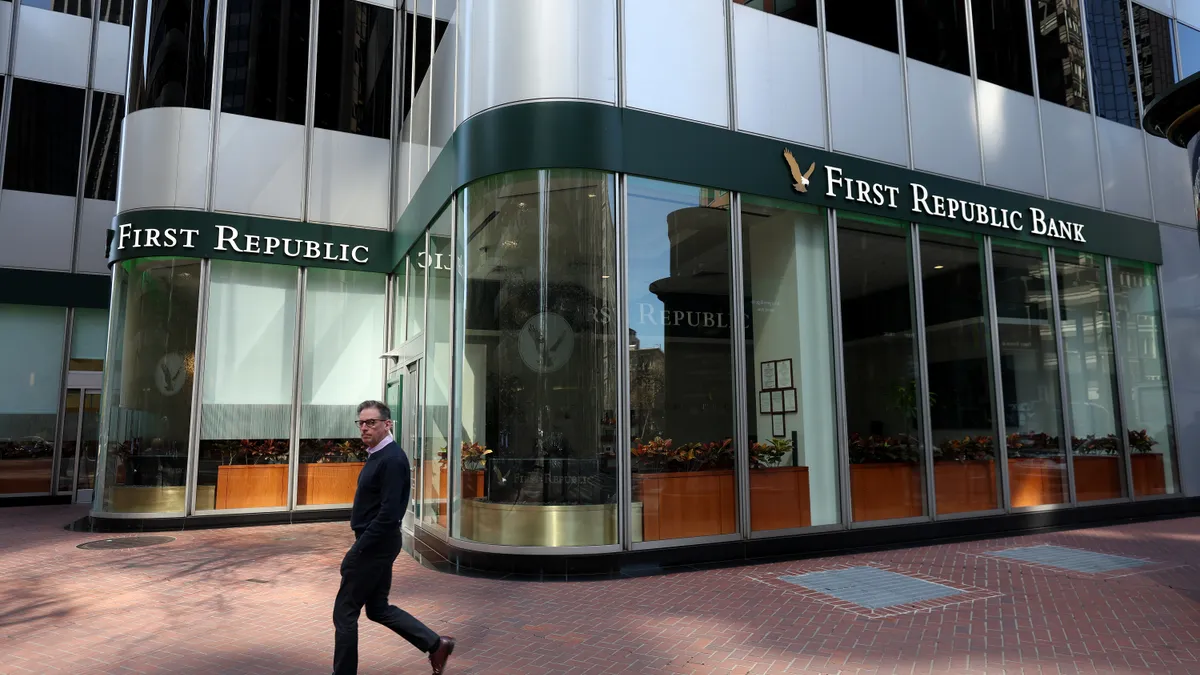Panic over deposit insurance prompted some everyday retail-bank customers to pull their money from regional banks Monday and put it in larger banks viewed as too big to fail.
Likewise, many investors in regional banks sold their stock in a market reaction Monday to a three-day span that saw regulators shut down Silicon Valley Bank and Signature Bank.
Four regional banks — First Republic, Zions, PacWest and Regions — saw their trading halted temporarily Monday amid price volatility, The Wall Street Journal reported.
Shares of San Francisco-based First Republic, for example, dropped nearly 62% on Monday. They regained 57% on Tuesday before again being halted for volatility, according to Reuters.
The selloff may have come in reaction to a statement First Republic made Sunday indicating it could access more than $70 billion in unused liquidity from sources including the Federal Reserve and JPMorgan Chase.
Despite the recovery in stock price Tuesday, Moody’s Investors Service placed First Republic on review for downgrade.
Zions’ share price fell as sharply as 44.1% early Monday and ended the day down 25.7%.
In a letter to customers Monday, seen by The Salt Lake Tribune, Zions CEO Scott Anderson said the SVB and Signature closures “rattled the markets as well as many people’s nerves,” but sought to reassure that Zions had “access to tens of billions of dollars of readily available liquidity.”
He also noted that the average account balance at SVB was “about 22 times the size of the average balance in a Zions account,” a statistic he said reflected greater stability.
Los Angeles-based PacWest, whose stock price dropped more than 21%, said in a regulatory filing Monday that its customers had withdrawn some $700 million in deposits as of late last week. The bank noted Monday that it had access to $14 billion in funds through a mix of cash, sellable securities, a credit line from the Federal Home Loan Bank of San Francisco and access to the Federal Reserve’s discount window, according to The Wall Street Journal.
As commercial, so goes retail
It should be noted that, like Silicon Valley and Signature, a sizable proportion of the affected banks’ clients are businesses. About 68% of deposits at First Republic were uninsured (i.e., over $250,000) as of the end of 2022, according to the Journal. That proportion stood at more than half for Zions and PacWest.
That didn’t stop ordinary consumers, however, from looking Monday to plow their savings and/or primary spending money into the likes of JPMorgan Chase, Bank of America, Wells Fargo and Citi.
Bank of America, for example, has seen more than $15 billion in new deposits in a matter of days, Bloomberg reported Tuesday, citing people with direct knowledge of the matter.
JPMorgan shortened the waiting time to open an account and is hastening the time frame for new corporate customers to access funds so they can pay staff at the end of this week, a source told the Financial Times.
Citi’s private bank, targeting wealthy customers, aims to open accounts within a day of application — truncated from the typical one to two weeks, sources told the Financial Times. The bank has also begun opening accounts and initiating money transfer procedures while new clients are still undergoing compliance checks, according to the outlet.
“The calls [from clients transferring deposits from elsewhere] have been coming in today like airplanes stacked on a snowy day at O’Hare airport,” one senior banker told the Financial Times.
The surge in activity spurred Wells Fargo analyst Mike Mayo to write Monday in a research note: “Goliath is winning.”
Even larger regional banks saw stock pieces dip by double-digit percentages Monday. U.S. Bank was down 10%; Truist, 17%; Fifth Third, 13%; KeyBank, 27%, according to The Wall Street Journal. And yet, KeyBank, for one, said it wasn’t seeing “anything unusual” with its deposits, according to the publication.
A hiccup for TD’s merger?
The price volatility raised concern for perhaps unforeseen consequences at some regionals. Memphis, Tennessee-based First Horizon’s stock price cratered by as much as 33% Monday morning before trading was halted, then resumed as shares closed 20% down on the day. That put the bank’s value at roughly 36% less than the $25-per-share purchase price proposed by would-be acquirer TD.
“With a walk date in May looming and bank stocks imploding, the question is: Will TD walk away or ask for a massive cut?” Cabot Henderson, a market strategist at JonesTrading, told Bloomberg.
A spokesperson for TD declined to comment to the wire service. First Horizon did not respond to requests for comment from Bloomberg on Monday.
“I think the likelihood that TD’s going to close this deal at the previously announced price is very low,” Nigel D’Souza, a bank analyst at Veritas Investment Research Corp., told Bloomberg.
Jason Goldberg, a Barclays analyst, expressed hope Monday, according to The New York Times, that “cooler heads” would prevail after Monday’s stock rout and outflow activity.
Former Goldman Sachs CEO Lloyd Blankfein appeared to concur.
“Everyone is breathing hard today,” he told the Times on Monday. “Maybe I’m missing it, but I think everything should settle down.”














